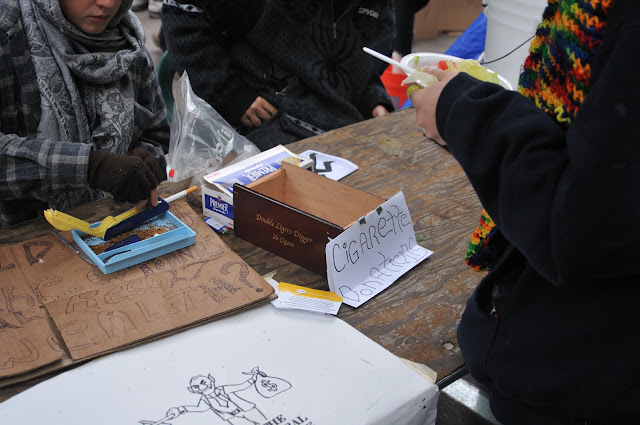I’ve
been meaning to write about the Occupy Wall Street protest but haven’t because,
well, because I feel very ambiguous about it.
I
know that if you are a liberal you are expected to support them, but I don’t
feel comfortable supporting something
that defines itself in the negative. I don’t feel comfortable doing a blanket
approval, even if I agree with a lot of what they have to say. They are
protesting against a system with many flaws, but also many benefits and
privileges that should not be taken for granted. I don’t feel comfortable
supporting a movement that criticises but does not offer constructive
alternatives, we already have too many politicians doing that.
Amidst
all this ambivalence I decided to go and have a look first hand.
The
first thing that shocked me is how small Zucotti park actually is. It is tiny, and
that is something that the media –which has been so criticised for not covering
this “historic event” properly- at no point has made evident in my view.
The
second thing that called my attention is that without a doubt if you put
together the photographers, media and tourists they outnumber the actual protesters.

The multiple signs asking for donations were equally disturbing. For what? For whom? One such sign was quite specific:
“to
take my girlfriend out for dinner”
not
the most convincing politically argument.
I
walked around amidst an excited atmosphere. It was a weekday, so the weekend
hordes were at bay, and us curious passer bys as well as the media could go
about our business fairly comfortably. Tourist busses passed by snapping away what
might become a new tourist attraction.
There was a drums band, a jazz band, and towards the end a classic band set out with multiple violins and other instruments.
On
that particular afternoon there were Queers Occupying Wall Street, Muslims Occupying
Wall Street (about 80 of them, and the women sat in the back during the speech,
which is a system that I would like to protest against myself), and once the
Muslims where finished, the praying mats
were replaced by bright green foam to make the space child friendly for the
Parents Occupy Wall Street sleep over.
That these three groups can coexist in such a small space is both exciting and confusing. I can’t imagine they would agree on too many things were they to actually sit down with each other. Still, they were all there, that says something.
Back
at home going over the photos I continued to feel equally confused and excited.
There were artists about. The idea of a street library seemed grand. The
atmosphere reminded me of the many pacifist protests that I attended in my
student days in Spain.
Spain
has an amazing tradition of pacific demonstrations. Actually, many would be
surprised to know that before OWS a similar thing took place in Spain earlier
this year. On May 2011 a pacific demonstration turned into an overnight stay at
Madrid’s main square, the Puerta del Sol. Their slogan was “indignados”
(outraged), opposing the same system flaws.
They had sofas, libraries and cafeterias with food donated from the
restaurants around the square, and were soon organised into action groups, both for mundane tasks such as clean up or more
strategic ones such as communications with the media. The movement soon spread
to other cities: Barcelona, Segovia, Valencia…
On
May 27 hundreds of wounded were reported as the protestors were evacuated in
order to clean the Plaza de Catalunya, sound familiar?
Eventually
it was disbanded. Nothing happened. I’d heard nothing about it since, which furthered my sense of
futile endeavour around OWS.
In
trying to understand what is going on I’ve been reading around and recently
discovered that the occupy puerta del sol has continued, albeit not as a
protest but a civil political movement #acampadasol which
still functions through monthly open popular assemblies putting forward
specific political agendas. Not sure how much of the 99% is involved but
certainly seems like an interesting and efficient civil action proposal.
Although
still confused generally I can say this: Zucotti park is clean, the protest is
not violent, there are people of all ages, creeds and gender.
But
there is another aspect that is
increasingly becoming clear as a result
of all this. The state/police reaction to what (to me) appears to be a
pacific and harmless civic action
is worrisome to the point of
ridiculous (see arrest of Naomi Wolf for
… well, obeying the law).
[....that guy is never going to hear the end of it.]
More
worrisome is the fact that she was diverted to another police station to keep
her lawyers away, and that “homeland “ security was invoked when people asked
to approach the police station.
[click on video to hear full explanation by Ms Wolf herself]
This
otherwise irrelevant incident has exposed a weak rule of law that can be
trampled over “a couple of middle aged couch potatoes” who haven’t broken the
law.
I find that unveiling this trend is so far the
most important achievement of the OWS movement. Ironic that this is coming out
just as the Arab spring is taking place
Responsible citizens need to keep watch, listen, read and
make sure that the basic freedoms America so proudly declares as her birth right
remain intact.


































